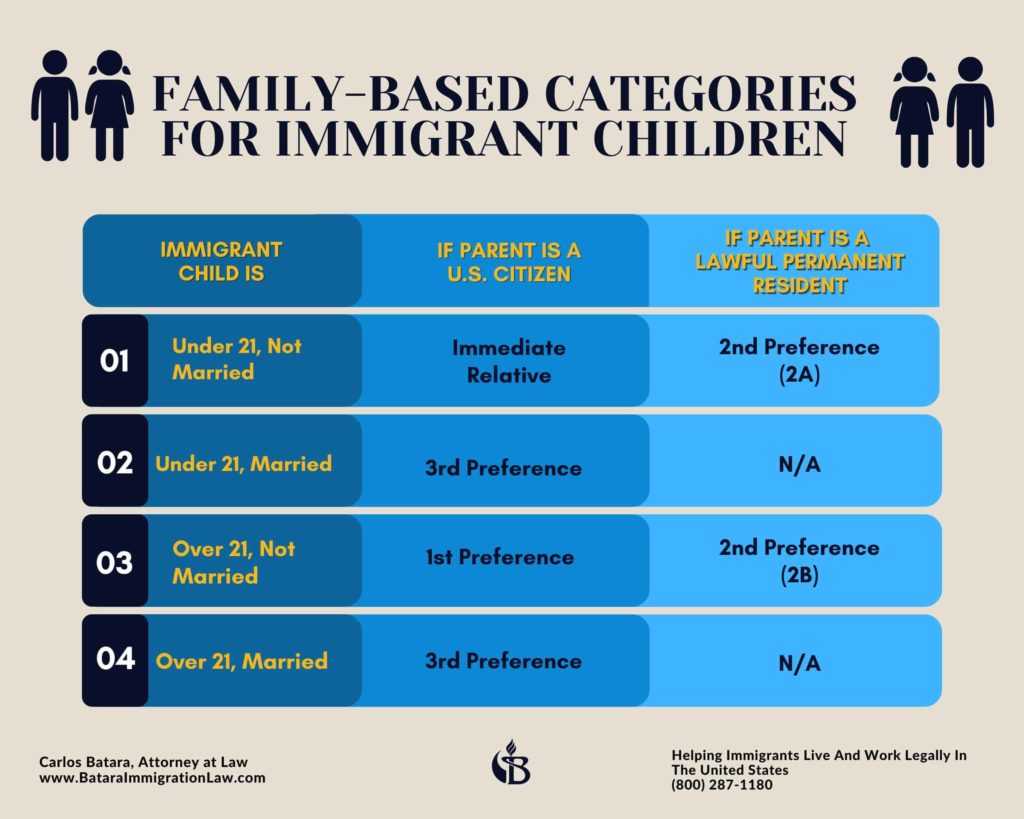
What Happens If I Get Married After My Parent’s I-130 Petition Is Approved?
Question:
“My father filed immigration papers for me several years ago. I was under 21 at the time. Now I am an adult. I am planning to get married. I went to a paralegal who told me if I get married, I have to start my immigration case all over again. But a friend, who has a sister who used to work in a law office, said that I can still win a green card through my father. I’m confused what to do.”
(Submitted by Roberta E., Nuevo, CA)
Answer:
Your situation is not uncommon. Either opinion could be right. It depends on the facts of your case.
As I will explain, what the paralegal and your friend are disagreeing about is centered on the issue of immigrant preference categories.
What Does A Conversion Of Family-Based
Immigrant Petitions Mean?
Some family-based petitions automatically change from one preference category to another category upon the occurrence of a major life event. In legal terminology, this is known as the conversion of family-based petitions.
A conversion of an immigrant petition is directly related to your priority date. It could mean a longer wait time, a shorter wait time, or a termination of your petition.
Allow me to explain.
How Changes To The Petitioner-Beneficiary Relationship Affects Immigrant Petitions
The paperwork your father filed is known as an I-130 petition.
Your father is considered the petitioner. You are the beneficiary.
When family members file petitions for their relatives, the filings are placed in categories depending on the relationship between the petitioner and beneficiary.
In your case, your father filed a child immigrant petition since were under 21.
Different things can happen between the date immigration papers are filed and the date of an immigrant’s green card interview. These include divorce, death, or like in your situation, turning 21 and marriage.
These events affect cases in various ways. They often modify the relationship between the petitioner and beneficiary.
And when the petitioner – beneficiary relationship shifts, it causes immigrant petitions, like the one filed by your father, to be moved from one immigrant category to another.
Such changes from category to category, deemed “conversions”, can slow down your case, speed up your case, and sometimes terminate your case.
This is the focal point of disagreement between your friend’s sister and the paralegal. They view the conversion to your petition that will occur if you get married in different ways.
Depending on a few details about your case, which you did not provide, either your friend’s sister or the paralegal could be correct.
To better understand how matrimony will impact your I-130, we need to first look at the family-based visa preference system.
The chart below summarizes the various categories for immigrant children.

Why A Parent’s Immigration Status Is Important To Immigrant Children Petitions
Let’s move to the specific facts underlying your I-130 petition.
The first issue we need to explore is your father’s immigration status.
As the chart above shows, whether he was a U.S. citizen or a permanent resident when he filed the I-130 petition on your behalf will determine which category you fit into at that time.
Your Father Appears To Have Been A Permanent Resident When He Filed The I-130 Petition On Your Behalf.
Because you wrote that he filed a petition on your behalf several years ago, I will assume he was a permanent resident at that time.
My assumption is based on the following.
You said that at the time of filing, you were not married and under 21 years old.
If he was a U.S. citizen when he filed, since you were an unmarried child under 21 years old, your petition would have been categorized as an immediate relative. This means the petition he filed for you would not be subject to the immigrant quota system and you would not have needed to wait several years before filing your permanent residence application.
(Of course, I am not sure what you meant by the term “several years”. If you have only been waiting one year or even two years, my hunch could be wrong.)
On the other hand, as a child under 21 years and unmarried, sponsored by a permanent resident, your petition falls under the Second Preference (2A) category. Your application is subject to the quota system and your wait will take longer before you can complete the green card process.
Four Types Of Conversions To Family-Based Petitions Involving Immigrant Children
As you can see, the immigrant visa system can be puzzling for children of immigrants trying to become permanent residents through their parents.
In cases like yours, the confusion often increases when the relationship between the petitioner and the beneficiary changes during the permanent residence process.
Based on what you have written, I perceive four possibilities – four different conversions – that might apply to your situation.
Ready to dive in?
Conversion Of Petition To A New Category Based On Changes In Beneficiary’s Status
The first two potential conversions are related to changes in (a) your age and (b) your marital status.
In short, you were under 21 and you are now over 21. You were unmarried but you are thinking about get married.
Example 1: Minor Child Of Permanent Resident Turns 21 (2A converts to 2B)
If my assumption about your father’s immigration status is correct, your petition fell under the 2A family preference category.
The first change since your father filed the I-130 petition is that you turned 21. Since you are now an unmarried daughter over 21 of a permanent resident, your petition has been “converted”. It now falls under the 2B category.
This is a lower preference category, which means your wait to become a green card holder will usually take longer than under the 2A classification.
If this is your situation, your friend’s sister is right.
Example 2: Adult Child Of Permanent Resident Gets Married (Petition Revoked)
What happens if you get married?
Unfortunately, there is nowhere to go in the immigrant visa preference system. This means you lose the ability to immigrate under your father’s petition. As the married daughter over 21 of a permanent resident, your priority date is lost. The petition is automatically revoked.
Here, what the paralegal told you is correct.
(Even if you were under 21 when you married, as the child of a lawful permanent resident, the I-130 petition would be revoked.)
Conversion Of Petition To A New Category Based On Changes In Petitioner’s Status
An I-130 petition can also be converted to a new category based on changes to the status of the petitioner, your father.
These conversions may have occurred if your father, after he filed the I-130 family-based petition, became a naturalized U.S. citizen.
Timing is important.
(Interestingly, sometimes a converted petition can lead to the green card processing in your case to move faster.)
So let’s take a deeper look at how your father’s naturalization might affect your case.
Although I assume your father was a permanent resident when he filed the petition, your question did not state whether he is still a permanent resident or is now a U.S. citizen.
Example 3: Father Becomes U.S. Citizen After Unmarried Child Turns 21
This example is why I said earlier you might be eligible to win a green card based on the facts of your case, even if you get married.
Perhaps your father was a permanent resident at the time he filed the I-130 petition. But maybe he has since become a naturalized citizen.
What if you already turned 21 before your father naturalized?
If he did naturalize (before you marry), then your I-130 petition changed categories. As a unmarried daughter of a citizen over 21, it was converted to the First Preference category.
Your petition stays alive.
Example 4: Father Becomes U.S. Citizen Before Adult Child Gets Married
If you now get married (after your father became a U.S. citizen), the petition would again be converted, this time to the Third Preference category.
Getting married, in other words, does not automatically stop you from qualifying for permanent resident status through a U.S. citizen father.
This means the sister of your friend is correct.
(However, remember example 2? If your father did not naturalize until after you were married, you’re out of luck. There is nowhere to go in the immigrant visa preference system. As the married daughter over 21 of a permanent resident, the I-130 is revoked.)
So whose opinion is correct? Your friend’s sister or the paralegal?
It depends.
Permanent Resident Through Marriage May Be A Quicker Route To Green Card Success
Here is another option to consider, especially if your father’s petition is revoked.
If your future spouse is a U.S. citizen or permanent resident, you could file for permanent resident benefits through marriage.
Even if you choose this option, I encourage you to exercise caution.
You must be careful to avoid pitfalls when seeking a spousal green card.
In particular, I have not talked about whether you entered the country lawfully or how long you have lived in the United States in unlawful status without authorization.
Even though you did not mention these concerns in your comments, they are far too important to leave unaddressed.
These issues could affect – indeed, damage – your case.
This is true no matter which category your father’s or husband’s petition fits into.
Hence, I encourage you to thoroughly review such issues, in the context of the category into which your application is properly classified, to determine if they apply to your case with competent legal counsel.
If you have an ongoing case right now, and you have immediate case-specific questions, you may want to visit our Immigrant Relative Petitions And Family Visas Attorney Services page for more information.
Or you might want to schedule a 1-On-1 Personalized Strategy And Planning Session to discuss the ins and outs of your case in depth.





